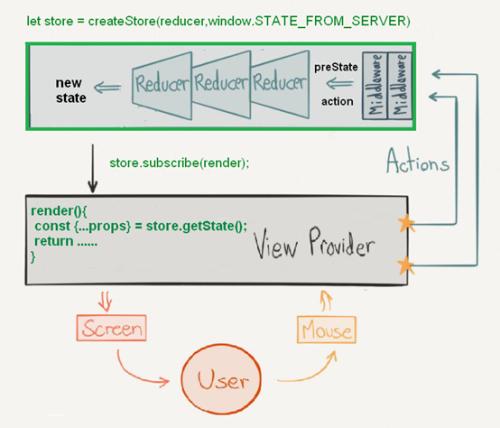redux基本概念
基本概念
1.store
用来保存数据的地方,使用createStore来生成数据
store = createStore(fn)
2.state,通过拷贝store中的数据得到
state = store.getState()
3.action,用来表示视图发生的变化
action = {
type:'ADD_TODO',
payload:'Learn Redux'
}
4.Action Creator 用来生成action
const ADD_TODO = '添加 TODO'
function addTodo(text){
return {
type:ADD_TODO,
text
}
}
5.dispatch 用来发出action
store.dispatch(addTodo('Learn Redux'));
6.reducer 用来处理action,返回新的state
const reducer = function(state,action){
return new_state
}
createStore
function createStore(reducer,initState,enhancer){
//0.接收state,添加观察者
let state = initState
let listeners = []
//1. 获取state
function getState(){
return JSON.parse(JSON.stringify(state))
}
//2.造一个dispatch来发送action
function dispatch(action){
state = reducer(state,action)
listeners.forEach(linstener => linstener())
}
//3.添加订阅者
function subscribe(listener){
listeners.push(listener)
return function(){
listeners.filter(item => item != listener)
}
}
return {
getState,
dispatch,
subscribe
}
}
combineReducer
//先拿到reducer
function combineReducer(reducer){
//把state和action交给reducer处理
return (state={},action) => (
//拿到对应reducer的处理结果在把原来的属性拷贝到新对象上
Object.keys(reducer).reduce((cur,key) => {
cur[key] = reducer[key](state[key],action)
return cur
},{})
)
}
bindActionsCreators
function bindActionsCreators(actions,dispatch){
//先拿到actions和dispatch
return Object.keys(actions).reduce((obj,key)=>{
obj[key] = function(){
//等执行的时候在调用真正的actions和dispatch
dispatch(actions[key].apply(null,arguments))
}
return obj
},{})
}
ApplyMiddleware

1.在action之后redecer处理之前
中间件的执行过程

const middleware (dispatch) => (
(action) => {
console.log('middleware')
dispatch(action)
console.log('after middleware')
}
)
const middleware1 (dispatch) => (
(action) => {
console.log('middleware1')
dispatch(action)
console.log('after middleware1')
}
)
// middleware -> middleware1 -> action -> middleware1 -> middleware
compose函数的虹吸现象

//先执行栈顶的middleware然后回流到栈底的middleware
const compose = (middlewares) => (
middlewares.reduce((a,b) => (
(...args) => a(b(...args))
))
)
中间件的实现
const middleware1 = dispatch => (
action => {
console.log('middleware1')
let res = dispatch(action)
console.log('after middleware1')
return res
}
)
const middleware2 = dispatch => (
action => {
console.log('middleware2')
let res = dispatch(action)
console.log('after middleware2')
return res
}
)
const middleware3 = dispatch => (
action => {
console.log('middleware3')
let res = dispatch(action)
console.log('after middleware3')
return res
}
)
let middlewares = [middleware1,middleware2,middleware3]
const compose = middlewares => middlewares.reduce((a,b) => (
(...args) => a(b(...args))
))
const dispatch = (action) => {
console.log(`action: ${action}`)
return action
}
//这是最后一个中间件,调用它将返回第一个中间件
const afterDispatch = compose(middlewares)(dispatch)
const testAction = args => ({
type:"ACTION_TEST",
args
})
afterDispatch(testAction('plus!'))
applyMiddleware
const compose = middlewares => middlewares.reduce((a,b) => (
(...args) => a(b(...args))
))
//1.接收中间件
export default function applyMiddleware(...middlewares){
//2.接收store方法
return function(createStore){
//3.接收reducer
return function(reducer){
let store = createStore(reducer)
let dispatch
let middlewareAPI = {
getState:store.getState,
dispatch:action => dispatch(action)
}
//把state和dispatch方法传给中间件的一个函数
middlewares = middlewares.map(middleware => middleware(middlewareAPI))
//将dispatch传入中间件,把dispatch传给最后一个中间件,把最后一个中间件的第2个函数传给上一个函数,虹吸
dispatch = compose(...middlewares)(store.dispatch)
return {
...store,
dispatch //先执行middleware1
}
}
}
}
react-redux
Provider
class Provider extends React.Component{
//静态属性childContextTypes声明提供给子组件的Context对象的属性,并实现一个实例getChildContext方法,返回一个代表Context的纯对象 (plain object) 。
static childContextTypes = {
store:propTypes.object.isRequired
}
getChildContext(){
return {
store:this.props.store
}
}
render(){
return this.props.children
}
}
Connect
function Connect(mapStateToProps,mapDispatchToProps){
return function(WrapedComponent){
class ProxyComponent extends React.Component {
//子组件需要通过一个静态属性contextTypes声明后,才能访问父组件Context对象的属性,否则,即使属性名没写错,拿到的对象也是undefined。
static contextTypes = {
store:propTypes.object
}
constructor(props,context){
super(props,context)
this.store = context.store
//初始化state
this.state = mapStateToProps(
this.store.getState()
)
}
componentWillMount(){
//当state发生变化的时候通过setState更新组件的变化
this.unsubscribe = this.store.subscribe(()=>{
this.setState(mapStateToProps(this.store.getState()));
});
}
componentWillUnmount(){
//当组件删除的时候取消监听state的变化
this.unsubscribe();
}
render(){
let actions = {}
if(typeof mapDispatchToProps == 'function'){
actions = mapDispatchToProps(this.store.disaptch);
}else if(typeof mapDispatchToProps == 'object'){
actions = bindActionCreators(mapDispatchToProps,this.store.dispatch);
}
return <WrapedComponent {...this.state} {...actions}/>
}
}
return ProxyComponent
}
}


